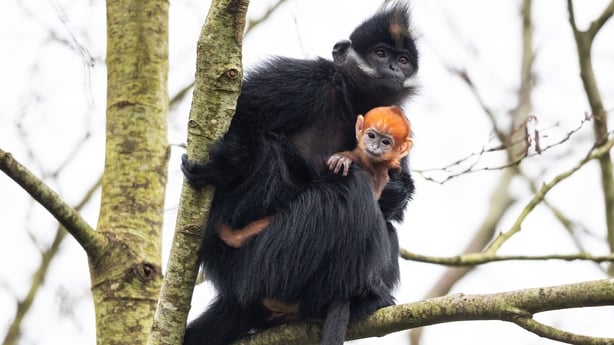Fota Wildlife Park is celebrating the arrival of the first baby François' langur Monkey to be born there.
The baby was born on 22 November to mother, Mei and dad Shinobi.
The François’ langur monkey is classified as endangered by the International Union for Conservation of Nature (IUCN).
The mother, Mei, who was born in 2016, and her younger sister Kaili, who was born in 2018, made their journey to Fota Wildlife Park from Twycross Zoo in the UK in September 2022 as part of a European Endangered Breeding Programme (EEP).
Joining them shortly after was Shinobi, born in 2016, who arrived from ZSL Whipsnade Zoo in the UK in December 2022.

Lead Ranger Teresa Power said "We hope the birth of this baby will help raise awareness about the critical need for conservation efforts for the François’ langur. There is a wild population of 1,400–1,650 in China and fewer than 500 left in Vietnam.
"As a member of the European Association of Zoos and Aquaria (EAZA) we will be participating in their 2024 "Vietnamizing" conservation campaign, drawing attention to threats to the country’s amazing biodiversity and animal species, such as the François’ langur, whose wild populations are currently under pressure from habitat loss, hunting, and poaching."
The baby François' langur monkey (Trachypithecus françoisi), with striking orange colouring, stands out against the contrasting black fur of the adults in the group.
"The baby’s coat is expected to transition from orange to black over the next few months, which is the natural development of François’ langur monkeys", Ms Power said.
Fota Wildlife Park is calling on the public to help name the new baby via its website.
We need your consent to load this rte-player contentWe use rte-player to manage extra content that can set cookies on your device and collect data about your activity. Please review their details and accept them to load the content.Manage Preferences
Speaking on RTÉ's News at One, Sean McKeown, Director of Fota Wildlife Park said the rarity of the François' langur monkey makes breeding in captivity difficult.
"There is a small population of around 100 in captivity, but growing. Hopefully we will have another youngster born in next year."

